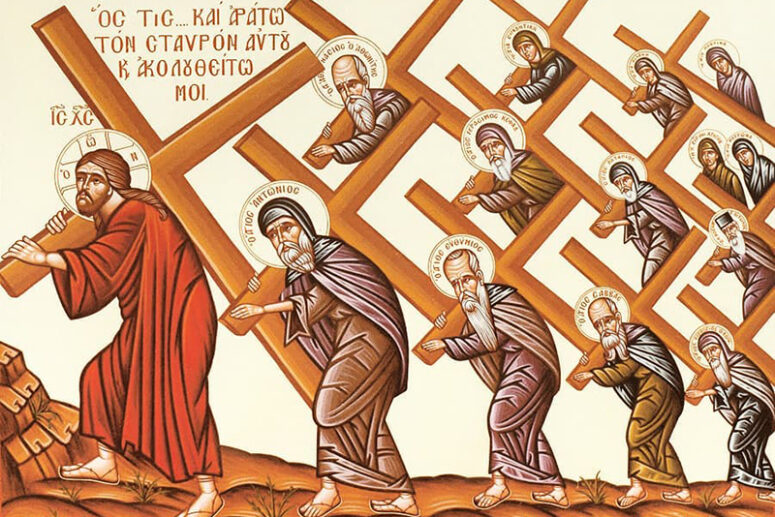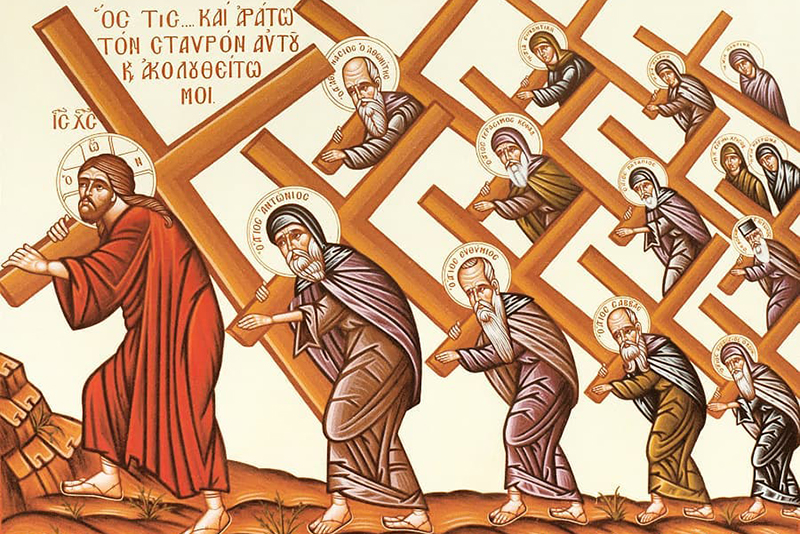
Only bitter medicine can cure the fallen man from his afflictions, writes Priest Andrey Chizenko
Life is running
Life is flowing
Life is rushing by,
And carrying us away.
The gospel says: Then Jesus said to his disciples, “Whoever wants to be my disciple must deny themselves and take up their cross and follow me.” (Matthew 16:24). As explained in a footnote to the Synodal translation of the Bible, the cross refers to our human life.
The ‘cross’ is synonymous with ‘life’. So ‘taking up our cross’ should mean the same as ‘taking up our lives. This raises the question: When we take up our lives, where do we take them? The fragment is clear on this: to God. But why did the Lord equate our life with the cross?
For thousands of years, the secular world has viewed human life – like a carnival, a fireworks show, a perpetual celebration and never-ending fun. Our faith, however, teaches us that all such fun is akin to a feast amid a plague. So it would take the bitter medicine of the cross to cure the fallen man of his affliction. The cross is both an execution weapon for our passions and sins, and a means of our resurrection and salvation.
Truly, as the Holy Apostle Paul wrote, “Those who belong to Christ Jesus have crucified the flesh with its passions and desires.” (Galatians 5:24). The symbolism of taking up the cross is very visible in the sacrament of baptism. It uses water; water symbolises the earth, and earth is a reminder of our mortality and interment. We immerse ourselves in water three times, which represents the death of our old selves, and redemption of our original sin along with all the others. We rise three times in the name of the Father, Son and the Holy Spirit, which evokes the resurrection of our new spiritual self, a creation of God. But to resurrect we must follow Christ, we must take up our cross, and carry it to our Mount Golgotha, which we cannot bypass if we want to resurrect.
The cross refers to all things and aspects of our lives – our talents and capabilities, our circumstances and life events, the people around us and generally all things that form our spirits.
As the Holy Venerable Serafim of Vyritsky liked to repeat, “For this thing is from Me.” All the things that ever happen to us are from Him. Our Lord is our Teacher, and the people on earth are His pupils. All our life events are from Him, and so are the people whom we encounter. This includes our enemies, too. The great book of Orthodox asceticism, the Philokalia instructs us to love our enemies. Yet for the fallen man and his sinful mind, this is an almost impossible feat. The Holy Fathers explain, or rather, show us where to start if we want to learn how to love our enemies. They teach us to view our enemies as a tool in the hands of God that He uses to steer us towards our correction. Figuratively speaking, our enemies (and all the people in general) are like a surgeon’s scalpel with which He opens our deep-lying sores, and cleans out the pus of our sins and passions.
In the film “Transfiguration” a rural priest – played by actor Sergey Makovetsky – remarks about his wife: “She is my knife stone.” By extension, we can view ourselves and a knife stone for another.
Our best doctor, our Lord, custom-makes for us the life circumstances and sends us the right people to reform us and put us on the right path.
As someone aptly described it, “our earthly life is a school for our spirit”. How well said!
In this world, we are only pupils. We bear the cross of our lives – which we sometimes find too heavy – to crucify our passions, to nail down our sins and vices, to learn to be thankful for the people we meet and to lift our spirit from the ground to die for the world and to resurrect in the spirit in our homeland in heaven.
Taking up our cross is a necessary part of it. It is the basis of our foundation.
Suicide, by which we give up and shed our cross voluntarily, is one of the gravest sins. The sin is in our rejection of the cross. It is like saying to God:
– I do not need what you have given me. I am not interested. Salvation? No, thank you. If You do not give me what I desire, even if I know that it is destructive, I will not accept what you are giving me.
This way, the sin of satanic pride speaks within us.
As we approach the Sunday of the Veneration of the Cross, let us all remind ourselves to take up our cross and bear it with dignity and patience. A death in the family is God’s will. In hospital? May God’s will be done! Take it as your chance to look at your life and see if any of your transgressions might have brought about your illness. Or could it be God’s way of encouraging you to slow down, look above you, say a prayer, observe a fast, or come to confession, take communion or extreme unction? Had a baby? Rejoice! It is God’s will. Got a job? Be thankful! Lost your job? Accept it with thanks. For it is God’s will too. The Lord, our Loving Father, will never abandon us.
Just take up and bear your cross. Do God’s will, and He will do it right for you. As one hegumeness told me, there were only two things that she asked of God: submission to His will and repentance. She also said that it was no use seeking worldly justice, for there is no justice in this world. But having justice in heaven is impossible without the cross. It is a universal law. No wonder, then, that we call it precious and life-giving. It is the spring of life for all men. Just realise this, and you will be rewarded with the joy of a conversation with God, which no one can take away from you. The Cross will become the door to your new life of purity and grace in heaven.
Translated by The Catalogue of Good Deeds
Source: https://pravlife.org/ru/content/pochemu-nuzhno-obyazatelno-nesti-svoy-krest-chto-eto-znachit




